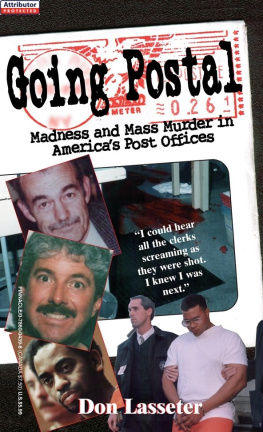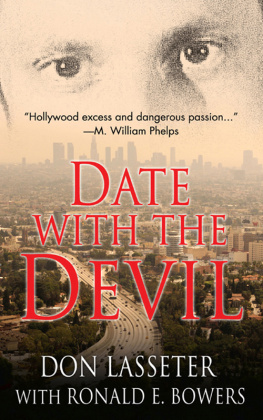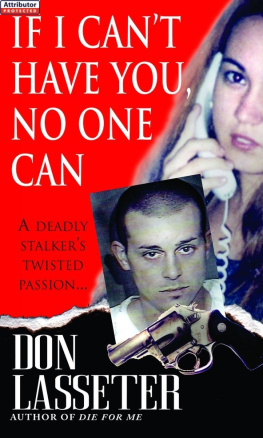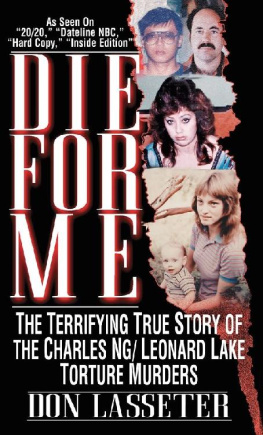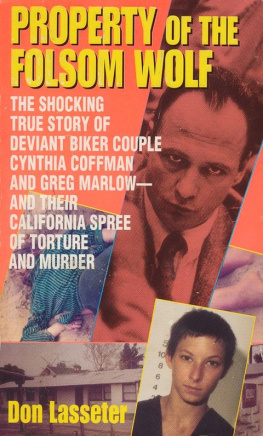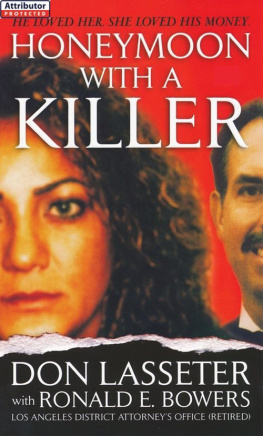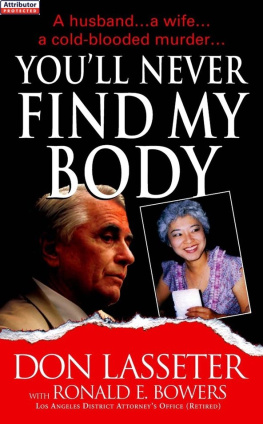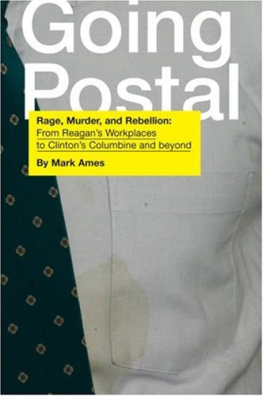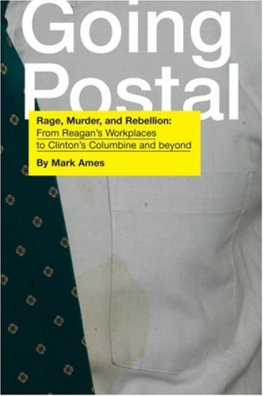Epilogue
As we researched the tragic murders, and interviewed postal employees, union officials, and others, all of them expressed hope that no one else would die as the result of violence in the workplace. Several of the union officials, while praying that it wouldnt happen again, see an increase in frustration and anger among employees, alarmingly similar to conditions that existed in the post offices prior to the murders.
When we gave media relations executives the opportunity to tell the USPS side of the story, they chose instead to accuse us of being unfair for spotlighting violence in post offices. In November 1996, one of the officials said, Well, there have been no incidents for over a year. We agreed there had been no murders since July 1995, but reminded him that employees had been wounded by coworkers in Palatine, Illinois, and Paterson, New Jersey during that time. The executive brushed us off and said he would rather not participate in a mass media book. So we conducted our research without him. We heard from several sources that deteriorating working conditions in some locations are building tensions which could possibly lead to another outbreak of violence.
Could It Happen Again?
Unfortunately, yes! And it did.
Six days before Christmas 1996, a recently fired employee of the Las Vegas, Nevada main post office allegedly shot and killed a senior labor relations supervisor. Charles Jennings, 41, had started with the USPS in 1978, and transferred to the large Las Vegas facility in 1993 as a mail clerk. He also served as a union steward who, at one time, reportedly had a bright future in the union hierarchy. That all crashed to the ground in May 1996 when the postal service fired Jennings for allegedly fudging on the amount of time he worked, and for which he was paid.
James Jay Brown, who spent 23 of his 59 years in the U.S. Air Force, received the Bronze Star for valor while serving in Vietnam. He joined the USPS in 1979 as a letter carrier, and gradually worked his way up through the ranks to become a senior labor relations supervisor. Off-duty, the father of three and the grandfather of two earned community praise as a high school football referee. His on-the-job reputation characterized him as an easygoing, non-confrontational man well liked by everyone. He would be remembered for always having a smile. A colleague chatted with Brown as Christmas approached and recalled the upbeat conversation. He was talking about how good life was.
When Charles Jennings appealed his job termination, and it went to arbitration, Jay Brown represented the USPS in the final hearing. Jennings lost.
On Thursday morning at 7:00 A.M ., as Brown stood in the employee parking lot at 1001 East Sunset Road, across the street from McCarran International Airport, Jennings allegedly arrived. Heated words were allegedly exchanged between the two men. Witnesses reported hearing five or six gunshots, and Brown collapsed within 15 feet of the employeess entrance. At least two bullets had struck him in the head. He died on the spot.
Jennings allegedly drove away. About 30 minutes later, he approached a traffic officer who was issuing a citation to another motorist. Jennings is alleged to have dejectedly told the officer, I just murdered someone.
In an early January 1997 hearing, Jenningss attorney said, My client never intended to shoot anyone that day... The evidence suggests initially that Mister Brown may have been shot while... trying to take the gun away from Mr. Jennings. The district attorneys office said that Jennings will be tried for first-degree murder and a jury will decide if he is innocent or guilty. Jennings defense will be that he and Brown got into an argument and he did not intend to kill Brown.
And so, the problems continue.
One former postal worker commented that management contributes greatly to the stress employees feel. The real problem is the adversarial relationship between management and the postal employees... They get rid of the good and promote the bad into management.
Another retired letter carrier complained, We were followed on our routes, timed to go to the bathroom, not allowed to talk to other carriers while casing mail. Its the worst job I ever had. Once, when we had a crisis in our family, the supervisor wouldnt even let me accept an emergency call from my daughter.
Ray Madueno, also retired from delivering mail in Southern California, has written a novel titled Muthers Day in which he chronicles problems besetting the carriers. One of his friends was murdered because he refused to hand over mail to a gangster who knew the schedule for delivery of welfare checks, called muthers day on the street. In his book, Madueno chides supervision, in one case for putting a carrier on administrative leave because his mail was stolen, even though it wasnt the employees fault. The author says he hated the pettiness. He saw a female coworker go berserk in the post office due to constant harassment from her supervisor. Such militaristic management, says Madueno, can lead to violent acts.
More input came from an expert on workplace violence who said a danger signal should be seen in an organization that has threats, intimidation, and assaults. In 1992, the post office set up a hotline for complaints and they got a skyrocketing number of calls. The bureaucracy hurts them. If they do a survey of their employees... by the time they get that done, guess what? Its time for another survey.
A resident of Las Vegas wrote a letter which was printed in the opinion section of the Las Vegas Review Journal. So theres been another postal worker murder, said the writer, a former California postal employee. He knew, he wrote, why these killings happen. Workers are treated like criminal fifth graders. The writer described the treatment as condescending and contemptuous. Emphasizing that he didnt condone murder, he said he simply wanted to suggest some preventive measures to be addressed by the postal service. His list included better sensitivity training for supervisors, who, the writer thought, are often former military personnel accustomed to issuing gruff orders to be blindly obeyed. He suggested psychological profiles for applicants, fresher colors on the workplace walls, and plants to soften postal environment. A better understanding of how people want to be treated is absolutely necessary. He complained that,... we were once told to regulate our bowel movements to avoid doing it on company time. He concluded with, What a mindset. I hope this may help.
We join you, sir, in hoping that something may help.
Of the 14 tragic incidents involving murder since 1983, four of the killers committed suicide. Two have been committed to mental hospitals. Five are serving either life in prison, or long terms. One is pending trial, and one is awaiting retrial.
The remaining one, Joseph Harris, who hacked his supervisor to death with a Ninja sword, executed her boyfriend with a gunshot to the head, and killed three postal workers, received two death sentences. He appealed the constitutionality of the 1982 New Jersey law which provided for a death penalty, challenging it on the basis of bias against blacks. The New Jersey Supreme Court scheduled a hearing on the matter in September 1996, but postponed it due to an event on death row in the state prison at Trenton.
On Friday evening, September 23rd, Harris collapsed in his cell and was taken to St. Francis Medical Center in Trenton, where they found severe cranial bleeding. Hed apparently not been taking prescribed medication for his high blood pressure, and slipped into cardiorespiratory failure. He died on the following Monday.

